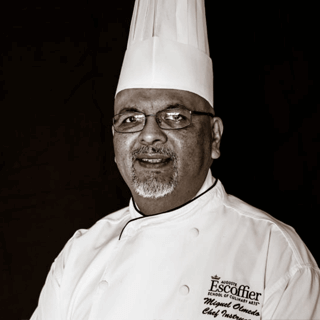CULINARY ARTS PROGRAMS
Get culinary career training at one of the best culinary schools in Texas.*
Explore More Programs
Discover the culinary speciality that’s right for you!
Online Programs
Austin Campus
Next start date: Aug 18
Our Texas Culinary School Paves the Way for Professional Success in the Culinary Arts
Picture yourself practicing your culinary skills with locally-sourced ingredients from farmers’ markets and gaining real-world experience through externships with experienced chefs and cooks.
The Escoffier Austin campus offers you a unique and enriching learning experience in the heart of a city known for unique flavor palates and innovative cuisine.
Austin campus facilities include:
- 6 professional-grade kitchens
- 8 learning classrooms
- Student-run Agricultural Learning Center
- A smoker
While gaining culinary skills and learning practical business skills, you can build your network, explore different aspects of the industry, and build out your career plan to pursue your dreams.
Austin’s diverse culinary scene is a great setting that can expand your experience of food and can prepare you to graduate and enter the dynamic culinary industry.
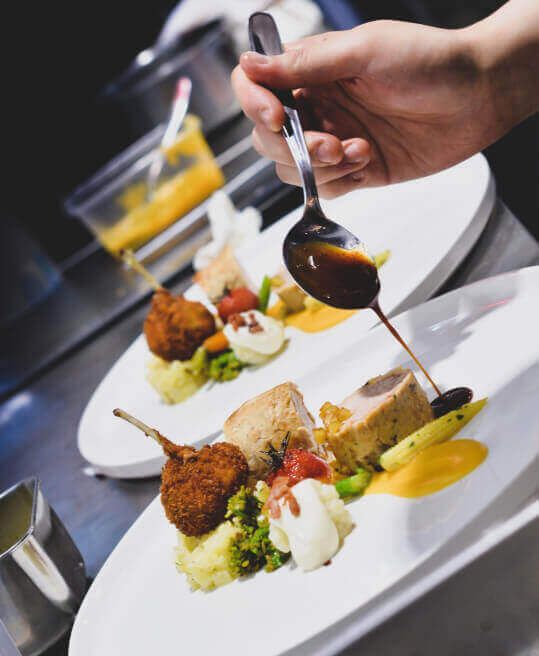
30‑60 weeks
Escoffier Austin culinary arts programs offer training in kitchen and business skills. Set yourself apart by earning a diploma in a little more than half a year or a degree in a little more than a year.
89%
The percentage of Escoffier Austin students who received an income-based federal Pell grant and/or a grant or scholarship from another source, according to the National Center for Education Statistics.
$7,613
For all students, the average amount of aid awarded in the form of federal student loans in 2022-23 was $7,613, according to the National Center for Education Statistics.
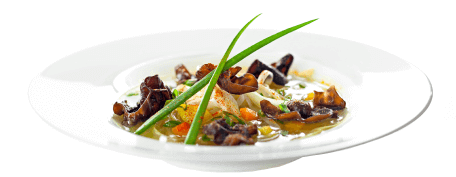
Watch This Short Video Tour of the Austin, TX Campus

Escoffier Austin Culinary Arts Courses for Career Skills
Our Texas culinary school curriculum emphasizes technical training and career preparedness.
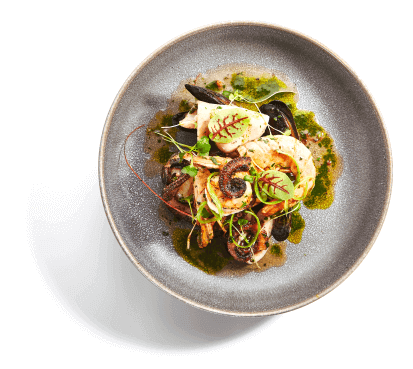
Studying culinary arts on-campus in Austin, Texas, can provide you with a practical and enriching learning experience.
Austin’s dynamic food scene, diverse culinary offerings, and abundance of local ingredients create a unique environment for culinary learning. You can work alongside experienced industry professionals and explore networking opportunities within the thriving culinary community.
Whether you’re starting out with the fundamentals of cooking or an industry insider looking to expand your skills, studying in Austin can offer a solid foundation for future career success.
- Study at our Austin, Texas campus, which is equipped with 6 learning kitchens
- Get personalized feedback from professional Chef Instructors
- Get culinary arts job search, interview, and career preparation assistance
- Access to alumni mentorship and employer partner network
Hybrid Online / Campus Option Available
Degree Program OnlyBalance work and other life commitments with our hybrid alternative. This option enables students to take their lecture (non-kitchen) courses online and attend campus three days per week compared to five days per week with our traditional on-campus program. Courses available online include Restaurant Operations, Culinary Entrepreneurship, Professional Communications, Technical Writing, World History and Culture, The Science of Nutrition, and College Algebra.
The Culinary Foundations class begins with course work concentrating on food safety and sanitation in the professional kitchen. The class focuses on the importance of proper hygiene, food handling, food storage, cleaning, pest control and HACCP in a food service operation are explored. The State Food Safety exam is administered as part of this course.
Additionally, the historical background of the culinary arts profession are studied and students will gain an introduction to the professional kitchen by tracing the origin of classical cuisine and gaining an overview of the development of modern foodservice. Students also start to become acquainted with tools, utensils, and equipment and discuss kitchen layout.
Basic cooking techniques, culinary terminology, equipment operation, the use and effect of heat, and seasoning principles are taught in this course. This course also includes fundamental knife skills, cutting techniques, and the concept of mise en place. Conversion methods and standard measurements, as well as yield cost analysis; portion sizing and food costing are covered.
In the Culinary Arts course, students build upon the foundations taught in Culinary Foundations. The course begins with an overview of breakfast cookery including classical American breakfast items such as egg cookery, quick breads, muffins, biscuits, and breakfast meats.
Students will study the art and science of baking and pastry arts and learn to prepare items ranging from bakeshop staples to international restaurant quality desserts covering the theory and chemistry of the pastry arts. Cakes, tortes, icing, and decorating techniques are also covered.
Charcuterie and Garde Manger are also covered in this course. Classic charcuterie includes items such as pâtés and terrines, and Garde Manger will cover buffet presentations and the preparation of hot and cold hors d’oeuvres.
In this course, students will explore the history and culture underlying other gastronomic areas of the globe. Students will replicate some of the classic dishes from East, South, and Southeast Asia. Students will also practice preparing Middle Eastern as well as some North African recipes. This course also includes foods of the Americas including current food trends and the culinary and cultural influences of Central America and the Caribbean.
The Farm To Table® Experience course provides the students with a hands-on experience on a working farm/ranch or vineyard/orchard. The Instructor conducts the lecture and lab activities to coincide with the harvested item(s) for a catered event executed by the students on-site. The students, under the direction of a Farmer/Rancher collect or harvest foods and/or proteins for the students’ lab activities.
This class also focuses on the ever growing relationship between the chef and the farm/factory/ranch. This course will result in a daily lab menu production of selected sustainable and/or organic foods. Also presented will be concepts of traditional and nontraditional farming and sourcing for vegetables, as well as the impact of land and sea animal-based food sourcing as practiced globally.
This course provides opportunities for real life experiences in an operational restaurant or related business and builds on the skills and techniques covered in previous courses.
Three out of five restaurants fail within five years of opening, often due to money mismanagement; this course gives students the skills to not only keep their restaurant in business but also turn a profit.
In this course, students study the hierarchy of management in food service and the skills needed to succeed as a manager: training employees, motivating them, disciplining them, and creating a safe and positive work environment. This course explores different types of menus (including both food menus and beverage menus) and their applications. Aspects of menu planning and design, ranging from visual design to price analysis to making use of available resources are covered.
The menu is both a financial tool and a communication tool, and students learn about its uses as both. Students are introduced to accounting and managing budgets, especially as it relates to the hospitality industry. Students learn how to minimize costs and maintain a full range of customer services.
This course covers such topics as business planning, pricing, credit management, government regulation, and legal concerns. Business ethics and the crucial role and importance of management and leadership are also covered.
The Culinary Foundations class begins with course work concentrating on food safety and sanitation in the professional kitchen. The class focuses on the importance of proper hygiene, food handling, food storage, cleaning, pest control and HACCP in a food service operation are explored. The State Food Safety exam is administered as part of this course.
Additionally, the historical background of the culinary arts profession are studied and students will gain an introduction to the professional kitchen by tracing the origin of classical cuisine and gaining an overview of the development of modern foodservice. Students also start to become acquainted with tools, utensils, and equipment and discuss kitchen layout.
Basic cooking techniques, culinary terminology, equipment operation, the use and effect of heat, and seasoning principles are taught in this course. This course also includes fundamental knife skills, cutting techniques, and the concept of mise en place. Conversion methods and standard measurements, as well as yield cost analysis; portion sizing and food costing are covered.
In the Culinary Arts course, students build upon the foundations taught in Culinary Foundations. The course begins with an overview of breakfast cookery including classical American breakfast items such as egg cookery, quick breads, muffins, biscuits, and breakfast meats.
Students will study the art and science of baking and pastry arts and learn to prepare items ranging from bakeshop staples to international restaurant quality desserts covering the theory and chemistry of the pastry arts. Cakes, tortes, icing, and decorating techniques are also covered.
Charcuterie and Garde Manger are also covered in this course. Classic charcuterie includes items such as pâtés and terrines, and Garde Manger will cover buffet presentations and the preparation of hot and cold hors d’oeuvres.
In this course, students will explore the history and culture underlying other gastronomic areas of the globe. Students will replicate some of the classic dishes from East, South, and Southeast Asia. Students will also practice preparing Middle Eastern as well as some North African recipes. This course also includes foods of the Americas including current food trends and the culinary and cultural influences of Central America and the Caribbean.
The Farm To Table® Experience course provides the students with a hands-on experience on a working farm/ranch or vineyard/orchard. The Instructor conducts the lecture and lab activities to coincide with the harvested item(s) for a catered event executed by the students on-site. The students, under the direction of a Farmer/Rancher collect or harvest foods and/or proteins for the students’ lab activities.
This class also focuses on the ever growing relationship between the chef and the farm/factory/ranch. This course will result in a daily lab menu production of selected sustainable and/or organic foods. Also presented will be concepts of traditional and nontraditional farming and sourcing for vegetables, as well as the impact of land and sea animal-based food sourcing as practiced globally.
This course provides opportunities for real life experiences in an operational restaurant or related business and builds on the skills and techniques covered in previous courses.
This course provides additional opportunities for real life experiences in an operational restaurant or related business and builds on the skills and techniques covered in previous courses.
The Business and Professional Communications course emphasizes the principles and practical
application of effective professional communication behaviors within a professional, business, and
organizational contexts. In addition to identifying the importance of effective communication skills to
the hospitality industry, communication styles and effective listening methods are addressed. Listening
skills, verbal and nonverbal communication, conflict resolution, cultural differences in communication,
and debate techniques are also covered.
Technical Writing prepares students to write in the hospitality and foodservice professions. In a professional setting, writing provides readers information they need in a format they can understand.
Unlike most academic writing, in which students demonstrate their learning to a professor who already knows the subject, in technical communication the writer is the expert, and the readers are the learners. In the hospitality and foodservice industries, students and professionals write a variety of documents for supervisors, colleagues, and customers such as explaining a problem or product, preparing a proposal, or illustrating a project. This course teaches students to adapt their writing to different audiences and purposes.
This course outlines strategies for making subjects clear to readers who need to understand them. To communicate effectively with an audience, writing must meet rigorous editing standards, in addition to writing in a clear, concise style and presenting information logically.
Throughout history, food has done more than just provide nourishment. From prehistoric times to the present day, food and the pursuit of it has had a transformative role in human history. Food has impacted societal organization, industrial development, military conflict, and economic expansion. As epicure and gastronome, Jean-Anthelme Brillat-Savarin stated, “Gastronomy governs the whole of human man.” In addition, food also serves a role in the cultural development of religion, economics, and politics. This course examines the role of food and its contribution and influence over history, culture, religion, economics, and politics. Food customs and attitudes are also explored, as well as, the social awareness selected food patterns and customs.
This course covers the basic principles of nutrition, emphasizing nutrients, food sources, and their role in growth, development, and overall health. Contemporary and global nutritional issues are also discussed.
College Algebra is an intermediate-level course in algebra. This course includes topics in equations and inequalities, graphing lines and circles, functions and their graphs, polynomial and rational functions, and exponential and logarithmic functions.
Immerse Yourself in the Farm To Table Experience®
Escoffier gives you the opportunity to work directly with farmers, providing a real-life glimpse of agricultural methods and practices. Our farm partners open their lives, homes, hearts, and businesses to Escoffier students for a true Farm To Table® Experience.
Possible farm experiences and observations may include:
- Harvesting
- Livestock
- Dairy
- Planting
- Cheese making
- Biodynamics
- Permaculture
- Hydroponics
- Greenhouses
- Composting and preserving

Farm To Table® Experience
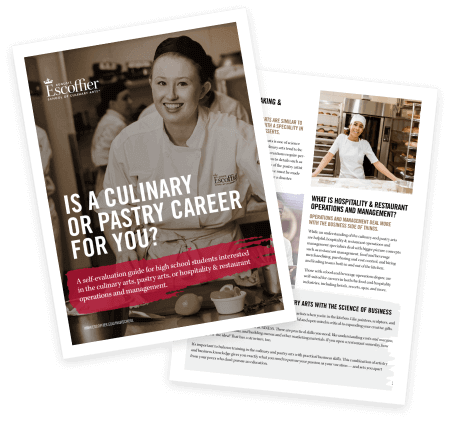
An externship can help you gain the hands-on experience and practical training that can prepare you to work as a culinary professional
Whether you’re dreaming of owning your own restaurant, working in a fine-dining restaurant, or creating your own recipes, Escoffier externships can help you to get hands-on experience in the culinary field of your program choice.
[Career Services department] sent over my application and my resume, and assisted me with setting up the [externship] interview. Within a week, I had an externship placement, and I was figuring out the logistics. That wouldn’t have even been a possibility for me if it had not been for the Chef Instructors and the support staff at Escoffier.”*
Your Options to Help You Afford Pursuing a Career in the Culinary Arts
*The percentage of Escoffier Austin students who received an income-based federal Pell grant and/or a grant or scholarship from another source, National Center for Education Statistics.
The average net price was $21,670 for grant or scholarship aid for students in the largest program for the time in academic year 2022-23.*
*College Navigator, National Center for Education Statistics
Program Cost: $37,745†
Program Length: 60
weeks
Program Cost: $22,253†
Program Length: 30
weeks
†Total program cost includes tuition, uniforms (non-refundable), toolkit (non-refundable), and an optional non-refundable technology fee (non-refundable). The Associate of Applied Science Degree in Culinary Arts cost also includes coursepacks. The cost of books is not included. Students may choose to purchase books when enrolling. For more cost details, see the catalog.
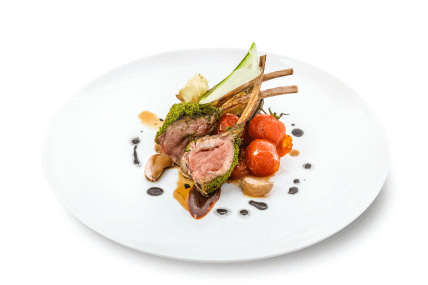
Academic weeks required to complete the degree or diploma program.
Hours per week recommended for academics and school-related activities, depending on the student’s learning style.
Approximate time required to complete an online application. Apply today!
Experience the Big, Bold & Unique Flavor Palates that Texas Has to Offer
Attending culinary school in Texas allows you to immerse yourself in the indulgent world of Southwestern cuisine while gaining a foundation in French culinary training that Auguste Escoffier himself established more than a century ago.
Here are some ways that you can enhance your culinary education in Austin:
Iconic Southern and Southwestern Cuisine
Austin is renowned for its Tex-Mex cuisine. The city also offers iconic Southern cuisine staples such as barbecue and chicken fried steak.
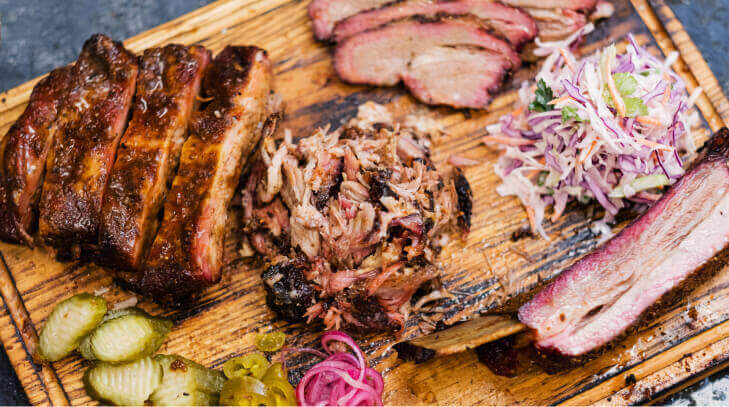
Local Farmers’ Markets
Explore the many farmers’ markets in Austin, such as the Texas Farmers’ Market and Barton Creek Farmers Market, to source fresh, locally-grown ingredients that can elevate your cooking.

Lively Food Festivals
Attend food festivals that bring the city together, such as the Austin Food and Wine Festival or the Texas VegFest to network with professionals, showcase your skills, and learn from professional chefs.

Immersive Food and Beverage Tours
With a focus on interaction, education, and cultural immersion, Austin’s food and beverage tours are a great way to discover the heart of the city’s vibrant food culture.

Need a place to live in Austin?
Austin Escoffier students have housing options
While we don’t provide on-campus housing, we collaborate with select housing partners in the Austin, TX area. Explore options ranging from apartment complexes to dorm-style accommodations. We’d love to help you find a home in Austin!
Need a place to live in Austin?
Explore a variety of options from our select
housing partner.
The Escoffier Austin Campus is Accredited and Respected Worldwide
The reputation of the institution where you earn your degree or diploma is an important measure of value, and Auguste Escoffier School of Culinary Arts in Austin is nationally accredited by the Council on Occupational Education (COE). It’s also approved and regulated by the Texas Workforce Commission-Career Schools and Colleges, and is authorized as an Associate of Applied Science degree–granting institution through the Texas Higher Education Coordinating Board.
Nationally Accredited School
Accredited by the Council on Occupational Education (COE)
*Based on comparable student population data for Austin and Boulder as currently reported in Integrated Postsecondary Education Data System (IPEDS).
My decision to choose Escoffier has got to be the best choice I’ve ever made for my career. I can’t say enough. It is an experience you will not regret.”
*This information may not reflect every student’s experience. Results and outcomes may be based on several factors such as geographical region or previous experience.
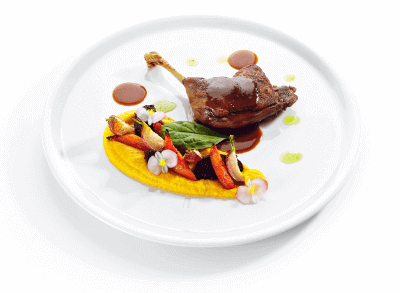
Meet Your Escoffier Austin Culinary Arts Chef Instructors
Your culinary arts journey at Austin starts here, with instructors that are dedicated to helping you succeed in the classroom and beyond. Regardless of the culinary career path that you choose, our Chef Instructors have the professional experience to help you pursue your goals.
Escoffier Chef Instructors aren’t just teachers; they’re enthusiastic guides who see potential in students. They know that reaching culinary goals is not just about learning techniques; it’s about creating a supportive learning environment. With personal encouragement and mentorship, they can help you set ambitious goals and confidently work towards culinary excellence.

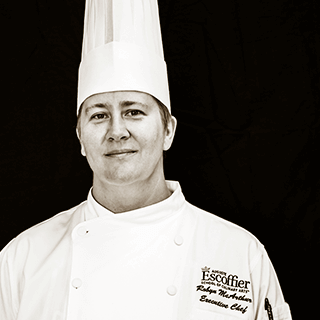
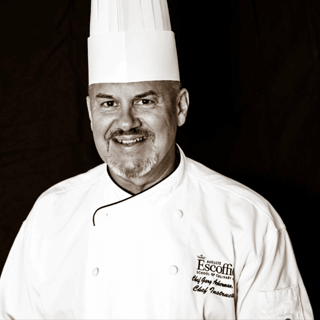
An Escoffier Austin Degree or Diploma Can Help You Stand Out from the Crowd
Choosing to work towards a degree or diploma at the Escoffier Austin campus can help open the door to a wealth of career opportunities. Our program has been carefully designed to provide graduates with the skills that lay a foundation for success in an ever-changing culinary landscape.
Our culinary arts programs can help you feel ready to step into sought-after positions in venues such as prestigious restaurants, resorts, institutional food operations and more. The extensive culinary curriculum spans everything from fundamental culinary skills to menu planning, providing you with practical skills that you can apply to any culinary career you pursue.
texas restaurant wages
Texas restaurant wages have risen between 13 and 23 percent in the past two years [2021 and 2022], depending on the position and location.
Example Job Titles
- Recipe Developer
- Line Cook
- Catering Assistant
- Banquet Cook
- Garde-Manger
- Food Critic
- Food Stylist
- Roundsman
- Personal Chef
- Prep Cook
- Menu Planner
Example Boulder employers
- Fine Dining Restaurants
- Hotels & Resorts
- Catering Companies
- Cruise Lines
- Private Clubs
- Food Styling Agencies
- Food Trucks
- Resorts & Spas
- Retirement Communities
- Corporate Dining
- Supermarkets
Some Esteemed Employers that Have Hired Escoffier Graduates

EXPLORE CAREERS AND EXTERNSHIPS IN OUR CAREER CENTER WITH THE HELP OF OUR CAREER SERVICES specialists
Get “insider knowledge” on how you can uncover career opportunities with our employer partners.
Career Planning
Resume and Portfolio Assistance
Interview Preparation
Escoffier Austin Admissions Requirements
To enroll at Escoffier Austin and get started in the culinary arts program, you need a high school diploma or general equivalency diploma (GED). You do not need any specific work experience, nor do you have to take the ACT or SAT to be admitted to any program at Escoffier. For more information, see our catalog.
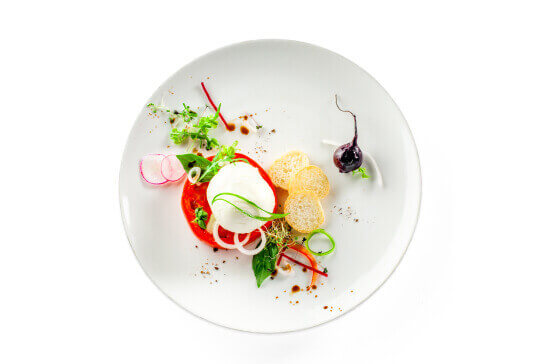
Frequently Asked Questions About Our Austin Culinary Arts Programs
How much does culinary school cost in Texas?
Total program costs for the Diploma in Culinary Arts in Texas is $22,253, and total program costs for the Associate in Applied Science Degree in Culinary Arts is $37,745.* See the costs for all programs here.
*Total program cost includes tuition, uniforms (non-refundable), toolkit (non-refundable), and an optional non-refundable technology fee (non-refundable). The Associate of Applied Science Degree in Culinary Arts cost also includes coursepacks. The cost of books is not included. Students may choose to purchase books when enrolling. For more cost details, see the catalog.
Financial aid is available for those who apply and qualify.
95% of Austin campus students who entered postsecondary education for the first time in academic year 2022-23 received some financial assistance. You can learn more about the financial aid process and speak with a financial advisor to help guide you through the process.
Is Auguste Escoffier School of Culinary Arts accredited in Texas?
Auguste Escoffier School of Culinary Arts in Austin, Texas, is nationally accredited by the Council on Occupational Education (COE). We’re also approved and regulated by the Texas Workforce Commission-Career Schools and Colleges, and authorized to grant Associate of Applied Science degrees by the Texas Higher Education Coordinating Board. Our programs are accredited by the American Culinary Federation Educational Foundation Accrediting Commission.
How do I enroll in Escoffier’s culinary school in Texas?
Enrolling in Escoffier’s culinary school in Texas takes place on our convenient online platform and typically requires only about 10 minutes to complete the application.
Our guide “How You Can Get into Culinary School” can provide an overview of the steps that you may need to take to enroll in Escoffier. You can also reach out to the Admissions Department for assistance during the process. Applications are accepted continuously for programs, and students who submit their application materials early will have priority with selecting their top shift, date, and program.
To apply, you’ll need to provide the following:
- Your location and demographics
- Emergency contact information
- Program of interest
- Proof of graduation
- A valid driver’s license, passport, or photo I.D.
After completing the application, you’ll review and submit it, then receive an enrollment agreement packet through DocuSign.
This is also an opportunity to consult with the Student Finance Department to explore various financing options. Financial aid is available to those who apply and qualify, and many of our students utilize financing options to fund their education.
What if I’m an international student living outside of the U.S.?
If you live outside of the U.S. and are interested in our culinary programs at our Austin, Texas campus, we’re here to help! Visit our International Students page to learn about admissions, visa support, and everything you need to get started.
Is financial aid or scholarships available to attend culinary school in Texas?
Yes! Financial aid is available to students who apply and qualify to attend Escoffier’s culinary school in Texas.
During the 2022-2023 academic year, 95% of first-time postsecondary education students at Escoffier’s Austin campus received some form of financial aid, after applying and qualifying. If you’re a student, we encourage you to contact our Financial Aid Department to explore your eligibility for grants or federally-backed loans.
Scholarships are also available for online Escoffier students who apply and qualify, including Work & Learn Scholarships, the Student Veteran Scholarship, and merit-based scholarships.
Learn more about the scholarships that you may qualify for.
Do I need to be a Texas resident to attend Escoffier’s culinary school in Austin, TX?
No, students from almost anywhere in the world can attend culinary school at the Escoffier Texas campus.
Do students at Escoffier’s Texas culinary school get dorms or housing assistance?
While we do not provide on-campus student housing, Escoffier partners with select housing partners in Austin, TX. Whether you’re looking for an apartment or dorm-style accommodation, we can assist you in finding a new home in Austin. You can get in touch with our housing services here.
Do I need a GED or high school diploma to go to Escoffier’s culinary school in Texas?
Yes, to be considered for culinary programs at Auguste Escoffier School of Culinary Arts in Texas, you need to have proof of high school completion or equivalent. This must be obtained through one of the following prior to the expected start date:
- High school diploma
- High school equivalency exam: GED, HiSet, or TASC
- State-approved homeschool certificate of completion
- Official college transcript from a completed Associate or higher degree program (degree must be in a program that fully matriculates into a bachelor’s level program)
- DD-214 for U.S. veterans, which reflects high school equivalency
Are SAT scores required to attend Auguste Escoffier School of Culinary Arts in Texas?
No, SAT scores are not required to attend Escoffier’s culinary school in Texas.
What GPA do I need for Escoffier’s culinary school in Texas?
GPA is not factored into the admissions decision for Escoffier’s culinary school in Texas.
Does Escoffier have an online culinary school in Texas?
Escoffier’s online culinary program is based out of the school’s Boulder, CO campus, but it’s available to students around the world, including those in Texas.
At the Austin, Texas campus, Escoffier students have access to a hybrid learning program for an Associate of Applied Science Degree in Culinary Arts.
The new hybrid alternative enables students to take their lecture (non-kitchen) courses online and attend campus three days per week compared to five days per week with our traditional on-campus program version. This is a convenient option for students who wish to balance work and other life commitments.
If you’re seeking an exclusively online program, Escoffier also offers a fully online diploma in Culinary Arts and Operations, and a fully online Associate of Occupational Studies degree in Culinary Arts (both of which include a hands-on industry externship) that are offered through our campus in Boulder, Colorado.
Visit our online culinary school program page to discover if an online culinary education is right for you.
Is Escoffier the best culinary school in Texas?
Escoffier has been recognized by Niche as the #2 best culinary school in America 2025. Our school is known for our experienced Chef Instructors, detailed curriculum, and focus on sustainable and farm-to-table practices. The curriculum can cover a wide range of topics, from basic cooking techniques to menu design, business skills, and diverse culinary concepts.
In addition to its culinary programs, Escoffier’s campus in Austin, Texas also offers a program in baking and pastry arts.
Our programs also include hands-on industry externships which can provide valuable practical experience for students in a professional kitchen setting.
If you are considering a career in the culinary arts, Escoffier’s culinary school in Texas can be a great choice for your education.
Check out our article on what you need to know about culinary school at Escoffier to learn more about what makes our school stand out.
How much is Escoffier’s culinary school for Texas residents?
Total culinary school program costs for Escoffier’s Texas campus are the same whether students are in-state Texas residents, out-of-state, or international students.
Total program costs for the Diploma in Culinary Arts in Texas is $22,253, and total program costs for the Associate in Applied Science Degree in Culinary Arts is $37,745.*
*Total program cost includes tuition, uniforms (non-refundable), toolkit (non-refundable), and an optional non-refundable technology fee (non-refundable). The Associate of Applied Science Degree in Culinary Arts cost also includes coursepacks. The cost of books is not included. Students may choose to purchase books when enrolling. For more cost details, see the catalog.
Financial aid is available for those who apply and qualify. You can learn more about the financial aid process and speak with a financial advisor to help guide you through the process.
How long does it take to complete culinary school in Texas?
Our Texas campus offers two culinary arts programs:
Diploma in Culinary Arts:
- Consists of 44 quarter credits, totaling 760 clock hours
- Curriculum spans 30 weeks to complete
Associate of Applied Science Degree in Culinary Arts:
- Requires 90 quarter credits, translating to approximately 1,340 clock hours
- The duration of the program is 60 weeks
- Completion of a specific diploma program may affect the timeline
Read more about the length of our programs here: How Long Does It Take to Finish Culinary School?
Note: All clock hours are based on average or expected time to complete an activity or category of activities. Some students may require more or less time to complete course requirements.
What culinary classes are taught at the Texas campus?
At the Texas campus, students exploring culinary arts can choose between diploma and associate degree programs, each tailored with comprehensive courses designed to cater to various aspects of culinary education.
The diploma program can provide foundational and practical knowledge through courses like Culinary Foundations, which emphasizes food safety, sanitation, and proper kitchen practices. Additional courses include Culinary Arts, where students can engage with the art and science of baking and pastry arts, and Regional Cuisines, which offers insights into the flavors and histories of major European cuisines. The Farm to Table® Experience offers unique, hands-on learning on a farm, enhancing students’ understanding of food sourcing and preparation.
For those pursuing an Associate of Applied Science degree, the program can broaden educational opportunities with courses available on campus and online, accommodating those who prefer a hybrid online/on-campus model. These include World History and Culture, Restaurant Operations, and Culinary Entrepreneurship, focusing on concepts relevant to hospitality operations, crucial for those interested in the business side of culinary arts. This degree path also incorporates Professional Communications and Technical Writing, essential for business and communication skills in a culinary context.
Both paths include a hands-on culinary industry externship, which can allow students to gain relevant work experience in approved food service establishments, which can be crucial for their professional development in the culinary industry. These structured programs are designed to provide a comprehensive educational experience that can help prepare students for various roles within the culinary field.
For a complete listing of all courses offered, please refer to the detailed course information provided higher up on this page.
How do I become a chef in Texas?
A culinary arts education in Texas can provide aspiring chefs with a solid foundation for a successful career in the culinary industry. While a culinary degree does not guarantee a job as a chef, it can equip individuals with the essential skills, knowledge, and hands-on experience needed to pursue a career in the field.
However, it’s important to note that a culinary education requires dedication, hard work, and perseverance. The coursework can be rigorous, and students will need to be able to handle the demands of a fast-paced kitchen environment. But for those who are passionate about cooking and have the drive to succeed, a culinary education can be a rewarding experience that starts the path to a fulfilling career as a chef.
In addition to an education, aspiring chefs should also pursue hands-on experience in a professional kitchen working under a mentor and continuous learning.
Additionally, culinary school graduates in Texas can have the opportunity of working in a state with a thriving culinary scene.
Austin, Texas, notably, offers a rich culinary scene with various top-notch restaurants, ranging from fine dining to casual eateries. It hosts numerous food festivals and events, which can present culinary professionals with ample opportunities for employment and career growth.
You can explore more information in these helpful articles:
Which culinary degree is best for high paying chef jobs in Texas?
The best culinary degree for high-paying chef jobs in Texas can vary based on individual career goals and the employer’s criteria at that specific culinary establishment. No degree can guarantee you a head chef position your first month out of school, but you might find yourself on a starting path to such culinary success with a degree in your back pocket.
Two prominent options offered at Escoffier’s Texas campus are the Diploma in Culinary Arts and the Associate in Applied Science Degree in Culinary Arts – both of which may present valuable opportunities for pursuing a career path as a chef.
Diploma in Culinary Arts:
- This program can offer a concentrated education on culinary techniques and skills, and it could provide a solid foundation for aspiring chefs.
- The shorter duration may allow individuals to enter the workforce more quickly, potentially leading to earlier income-generating opportunities.
- Graduates of the Diploma program can consider employment in a variety of entry-level culinary positions in establishments such as restaurants, hotels, and catering companies.
Associate in Applied Science Degree in Culinary Arts:
- This comprehensive program encompasses a broader range of courses, including the science of nutrition, professional communication, restaurant operations, and entrepreneurship.
- Graduates of the Associate degree program can consider employment in entry-level and potentially management positions in the culinary industry.
Ultimately, the choice between the Diploma and Associate degree depends on individual career aspirations and preferred learning paths. For those seeking a quicker entry into the workforce, the Diploma program may be a suitable option. Conversely, those aiming for leadership and management roles in the future may benefit from the more in-depth education provided by the Associate degree program.
Does a culinary school count as a college in Texas?
The definition of a college or “culinary college” is open to interpretation and there is not a singular definition of how the term is applied in Texas.
At Escoffier, we feel that our type of accredited, skills-based programs can be considered culinary trade school.
Not all colleges and universities are accredited, and neither are all trade or technical schools. Escoffier’s Austin, Texas campus is an accredited, degree-granting institution.
Read more about whether culinary school is considered a college.
Note: Auguste Escoffier School of Culinary Arts in Austin, Texas is nationally accredited by the Council on Occupational Education (COE). It is approved and regulated by the Texas Workforce Commission-Career Schools and Colleges, and is authorized as an Associate of Applied Science degree–granting institution through the Texas Higher Education Coordinating Board. Our programs are accredited by the American Culinary Federation Educational Foundation Accrediting Commission.
Is a culinary school considered a trade school in Texas?
Culinary schools can be considered trade schools in Texas. Trade schools, also known as vocational schools or career schools, focus on providing practical skills and training for specific trades or professions.
Many students are drawn to this trade school approach because it can typically offer a shorter completion timeline compared to many traditional colleges. This can enable graduates to join the workforce more quickly with industry-specific expertise.
If you are interested in learning more about the trade school distinction, check out our article: Is Culinary School Considered a Trade School?
Does Escoffier’s Texas culinary school provide job placement opportunities after graduation?
Escoffier’s culinary school in Colorado can help students with job search assistance after graduation. The Career Services team can help provide counseling, and tools to help students achieve their career goals and find employers that fit their professional aspirations.
All students at Auguste Escoffier School of Culinary Arts receive Career Services assistance both during their time in school and after graduation.
At our career center, students at the Colorado campus can get access to specialized tools to help them with career building, including: career planning assistance, resume and portfolio assistance, and interview preparation.
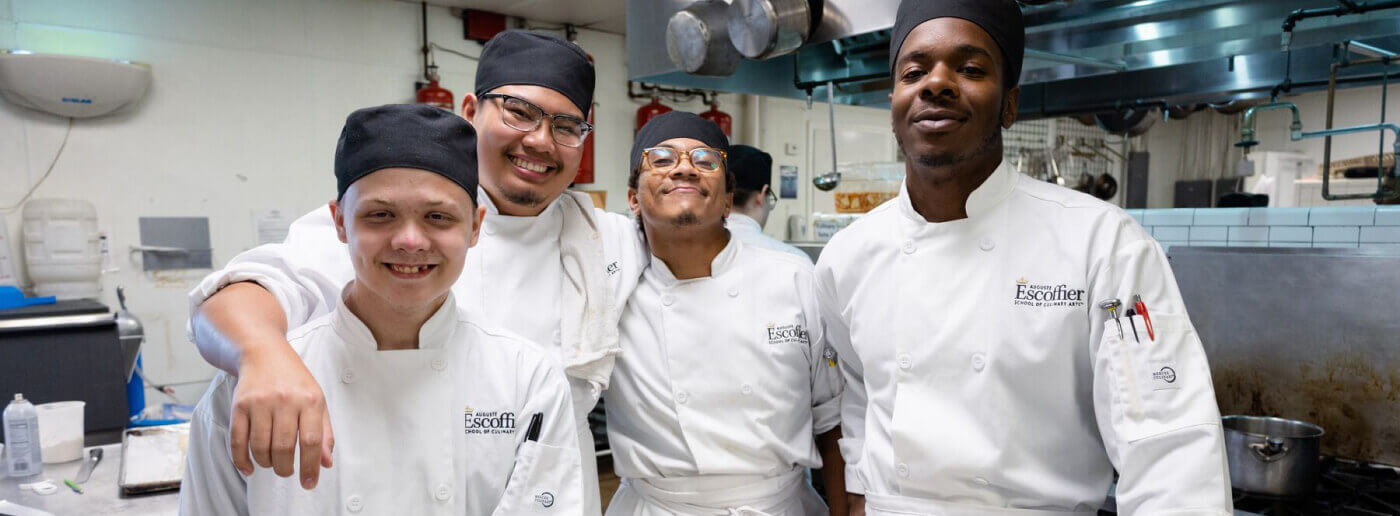
Take the first step towards your dream culinary career today at Escoffier Austin

